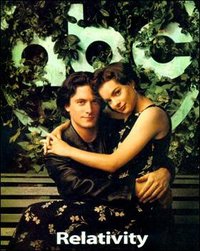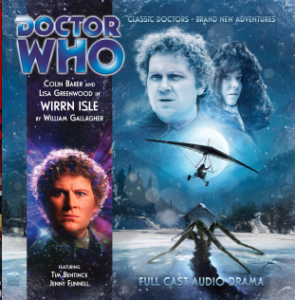If you don’t know something, fine. If I don’t know something, fine. We’ll work it out together. Or more likely one of us will look it up and explain it to the other. It’s not like there is a shortage of places to look things up.
But if you’re a writer and your characters don’t know something, that’s gigantic.
 Follow. Around 1996, I read the pilot script to a US series called Relativity. Written and created by Jason Katims, it was from the makers of thirtysomething and My So-Called Life. Plus, it was a romance and I like romances, naturally I read it. And I enjoyed that script a lot. I wish it were still online that I could point you at it.
Follow. Around 1996, I read the pilot script to a US series called Relativity. Written and created by Jason Katims, it was from the makers of thirtysomething and My So-Called Life. Plus, it was a romance and I like romances, naturally I read it. And I enjoyed that script a lot. I wish it were still online that I could point you at it.
I enjoyed it enough that of course I wanted to see the final show and I was enough of a writer to be curious to see how they would stretch this romance out to seven years of 20-odd episodes a year. They didn’t, as it happens. I think they made 17 episodes before being cancelled. I didn’t see any of them. I must’ve seen something, must’ve seen the title sequence or something because I knew what the major characters looked like.
But actual episodes: none.
Last year I got very excited when the pilot episode found its way on to YouTube – except that my face fell when I saw it. Because the YouTube copy was dubbed into German.
Now, though, the whole series is up on Dailymotion. Doubtlessly less than legally but then if the show were ever going to get a commercial release I would’ve bought that a long time ago.
As it is, nineteen years later, I’m finally watching the episodes.
It’s not great. Certainly not on a par with MSCL or thirtysomething. It tries to deal with some serious topics but it doesn’t have the bite of those other shows. And characters I remember liking on the page feel a bit whiny on the screen.
But.
What knaws at me in every single episode is one line from the title sequence.
It’s a smart sequence. If you ever seen a Bedford Falls show like thirtysomething, you’ve got the idea already: a montage of scenes, credits on the bottom of screen, great music by WG Snuffy Walden in his pre-West Wing days. All that.
But as well as the visual montage of scenes, this sequence has an audio one. Clashing, overlapping, audible and barely audible, clear and obscured lines rush by you in a way that seems chaotic. In practice every line is placed pixel perfectly in time and in the stereo image because you never fail to hear the key lines and you always fail to hear the lesser stuff.
It’s the main characters talking about relativity. “Like Einstein… E=mc squared…” They’re explaining what relativity is and quickly pushing the point. One key example is “the things you think you can’t do, you can do” which is just so far away from the definition of relativity that it belongs in a different series.
But then bam. The last line.
It’s said by the series star, Kimberley Williams, in character as Isabel Lukens. This show is primarily a romance but it’s really weighted toward her rather than her guy, Leo Roth (David Conrad). So this is your most important actor in the show’s most important role and she has the most important position in your entire title sequence. And she says:
“I have no idea what relativity means”
Then sodding look it up.
She says it with a laugh, with that kind of gosh, how could anyone be expected to know this stuff type of laugh.
If Isabel Lukens did not know what relativity meant despite having seemingly constant conversations about it, the character would be stupid. Not uninformed, stupid. Worse: passively stupid. She doesn’t know what a word means even though she’s just been discussing it. Couldn’t be bothered to either look the bleedin’ thing up or to listen to the people discussing it with her. Ignorant in every sense.
But Isabel is not speaking for herself. She says this to allow us to not know what relativity means. It’s okay not to know. In fact, gosh, who could know?
That one line is the most outrageously insulting line I can think of in TV title sequences. I don’t mean this because I know what relativity means, I mean because the makers assume we don’t – and the makers assume we need reassurance that this is not a bad thing.
I feel examining one line from a cancelled TV series of 19 years ago might be overkill. But I also feel that there is something in here about all of television and how all of it has gone down the reassuring ignorance route.
Didn’t we used to look up to TV characters? Was I just young? Detectives and heroes and all that, they were smart and they were cool and then something happened. I think it was around the time when computers became commonplace. Suddenly we hit the moment when we, the viewing public, knew more about this stuff than the TV characters did.
We knew and we know more than they are allowed to know.
TV characters are rarely allowed to be clever, certainly they are even more rarely allowed to think. Now thinking is a tough one to show visually – yes, I’m thinking Sherlock too but not every show can do what that does – so you can understand the problem. But if the plot requires a clever character, that character will not be the hero.
More, that character will be mocked for being clever. Just as you can’t be a woman doctor without a white coat, stethoscope and a clipboard, so you cannot be a clever character of either sex unless you wear glasses. And get kidded for being in some way socially awkward. Kidded by the cool-as-all-hell action hero, for preference.
We are expected to feel superior to the clever clogs. The expectation is that we will need to feel superior or we’ll stop watching.
I think I’ll make it to the end of Relativity but just four episodes in, that single line is threatening to stop me watching.
